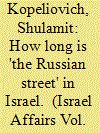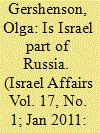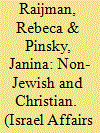|
|
|
Sort Order |
|
|
|
Items / Page
|
|
|
|
|
|
|
| Srl | Item |
| 1 |
ID:
101637


|
|
|
|
|
| Publication |
2011.
|
| Summary/Abstract |
This paper presents the results of a survey conducted in 2008 to examine the cultural practices and preferences of 'Russian' youth in Israel. Data was collected via structured questionnaires (187) and semi-structured in-depth interviews (21). Respondents were aged 16-24 and represented both the youth born in Israel to immigrant parents and those who immigrated before the age of 12. The results suggest that the cultural integration of 'Russian' youth in Israel does not follow a linear process. There is a large group of youngsters who choose to preserve their mixed or Russian cultural identity (e.g. in social networking, music tastes and entertainment) for reasons other than Hebrew language difficulties.
|
|
|
|
|
|
|
|
|
|
|
|
|
|
|
|
| 2 |
ID:
101638


|
|
|
|
|
| Publication |
2011.
|
| Summary/Abstract |
The article illuminates a sociolinguistic aspect of the large wave of immigration from the Former Soviet Union to Israel in the 1990s. It also investigates the discrepancies between the declared linguistic ideology, language management strategies, and actual language practices. The ubiquitous presence of Russian in the Israeli public sphere goes hand in hand with the rapid shift from Russian to Hebrew in the second generation of immigrants. The article discusses future perspectives of the maintenance of Russian in Israel through coordinating family efforts to preserve the immigrant heritage and multilingual educational policy at the state level.
|
|
|
|
|
|
|
|
|
|
|
|
|
|
|
|
| 3 |
ID:
101640


|
|
|
|
|
| Publication |
2011.
|
| Summary/Abstract |
This essay looks at immigrants' integration into the economic and cultural life of Haifa, one of the largest Russian-speaking urban enclaves. Based on participant observation and auto-ethnography, it reflects on visual and acoustic signs of the 'Russian' presence. It further analyzes factors determining the newcomers' choices of neighbourhood and subsequent intra-city migration. Immigrant-owned businesses catering to consumer tastes of ex-Soviets have become the meeting points of various ethnic groups inhabiting the city. Over time, educational institutions created by immigrant teachers and centres providing intellectual enrichment have switched to bilingual activities to meet the changing needs of co-ethnics and to attract a wider public, but the underlying pedagogical principles and cultural values behind them remain Russian.
|
|
|
|
|
|
|
|
|
|
|
|
|
|
|
|
| 4 |
ID:
101641


|
|
|
|
|
| Publication |
2011.
|
| Summary/Abstract |
The mass immigration from the Former Soviet Union (FSU) changed both the Israeli and Russian cultures. Since the 1990s, Russian immigrants and their homeland began appearing in Israeli films. Meanwhile, Jewish themes, including emigration, became more common in Russian cinema: Israel now appears in Russian films. Whether Russian or Israeli, these movies circulate through the internet, transnational TV channels, and Jewish film festivals, and are seen in Russia and elsewhere in the Russian diaspora. This shows that cultural processes in today's globalized mediated world are interrelated: as Russian-Jewish immigrants transform themselves through migration, they also transform cultures around them.
|
|
|
|
|
|
|
|
|
|
|
|
|
|
|
|
| 5 |
ID:
101639


|
|
|
|
|
| Publication |
2011.
|
| Summary/Abstract |
This paper focuses on a specific group of post-1989 Former Soviet Union (FSU) migrants in Israel, those who prefer to keep their Christian religion in a country with an explicitly Jewish character. Specifically, we focus on (1) immigrants' perceptions of state and institutional discrimination against non-Jewish immigrants, and (2) immigrants' construction of social distance and social boundaries across ethno-cultural groups. Our findings suggest that Christian immigrants challenge the hegemonic definition of who is a Jew, strongly contest the Israeli ethno-national regime of incorporation that discriminates against non-Jewish citizens, and advance claims for equal rights. Religion becomes the most important marker for identity construction. Shared national background (country of origin) does not necessarily guarantee solidarity and cordial social relations between immigrants.
|
|
|
|
|
|
|
|
|
|
|
|
|
|
|
|
| 6 |
ID:
101634


|
|
|
|
|
| Publication |
2011.
|
| Summary/Abstract |
Political orientation and electoral behaviour of Former Soviet Union (FSU) immigrants in Israel differ significantly from the old-timers with similar demographic characteristics. We explore the main social and demographic factors that may explain attitudes expressed by FSU immigrants toward democratic values, with the emphasis on their Soviet/post-Soviet background. Despite apparent continuity in the value orientations, the findings also point to the on-going process of political re-socialization among FSU immigrants. Among adult immigrants, the years after migration do not seem to affect their values, while the youth socialized partly in Israel is prone to a more democratic outlook.
|
|
|
|
|
|
|
|
|
|
|
|
|
|
|
|
| 7 |
ID:
101635


|
|
|
|
|
| Publication |
2011.
|
| Summary/Abstract |
Mass Soviet Jewish emigration has turned Israel into the largest centre of Russian-speaking Jewry in the world, and became a critical factor in the local political landscape. This group managed to change the previous right-left balance and thus became a desirable target for any candidate seeking to head the government as well as the majority of nationwide parties. 'Russian' immigrants themselves very soon became split over the general issues of Israeli politics (ideological, civic, ethnic and class controversies), that in fact indicted their integration into the local society. Finally, since the late 1990s FSU immigrants are almost equally divided between mainstream and community-centred parties, leaning towards movements that combine both sectarian and nationwide agendas.
|
|
|
|
|
|
|
|
|
|
|
|
|
|
|
|
| 8 |
ID:
101636


|
|
|
|
|
| Publication |
2011.
|
| Summary/Abstract |
The recent wave of immigration from the Former Soviet Union has created the largest ethno-linguistic community of over 1 million people in Israel. Rising communication needs of the newcomers led to the rapid development of Russian-language media that fulfil a dual function: preserving the immigrants' original identity and ties to the former homeland while also addressing new challenges of social and cultural integration. This article explores the main trends in Russian-language media consumption in Israel and illuminates their social and cultural roles in the immigrants' adaptation, with a special emphasis on youth and more recent arrivals.
|
|
|
|
|
|
|
|
|
|
|
|
|
|
|
|
| 9 |
ID:
101632


|
|
|
|
|
| Publication |
2011.
|
| Summary/Abstract |
Drawing on Israeli, German and US census data, we compare the educational levels of Jewish immigrants (and their non-Jewish family members) from the Former Soviet Union (FSU) arriving in Israel, Germany, and the US during 1990-2000. The comparison of educational levels among immigrants arriving in the three countries can be viewed as a 'natural experiment' in immigrants' destination options, whereby immigrants could choose two countries with practically no visa restriction (Israel and Germany) and one country (USA) with visa requirements. Drawing on Borjas' theory of self-selection, the paper discusses the relative attractiveness of the three countries to various types of immigrants, expecting highly educated immigrants to prefer destinations where returns on skills are higher. The findings support theoretical expectations: highly educated migrants were more likely to move to the US, where the labour market is more flexible and returns on skills are higher than in Israel or Germany.
|
|
|
|
|
|
|
|
|
|
|
|
|
|
|
|
|
|
|
|
|